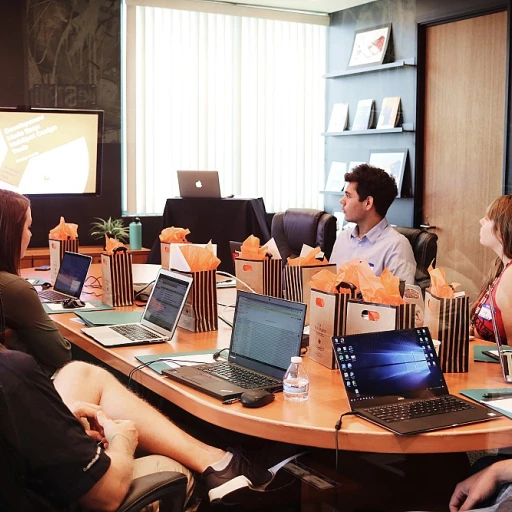
Understanding Flexible Desking
Exploring the Concept of Flexible Desking
Flexible desking is revolutionizing the modern office environment, especially in Arabian Emirate companies. As businesses strive to optimize workspace efficiency, they are increasingly turning to innovative solutions such as desk sharing, hot desking, and flexible work arrangements to maximize their resources. Flexible desking allows businesses to adapt their office space for a dynamic workforce by offering shared desks that are available on a need-basis. This means employees do not have assigned desks but rather book desks as required or use shared office spaces, facilitating hybrid work models. With an emphasis on efficient use of office space, companies can reduce costs associated with maintaining a permanent desk for each employee, especially when many are working remotely or in the field. This approach is not just about saving costs; it's about creating a flexible work environment where team members can thrive. By providing various workspace options like dedicated desks when needed, meeting rooms for collaboration, and hot desks for transient tasks, businesses can cater to different work styles. Modern desking systems also encompass technology that supports desk booking and sharing policy management, ensuring that employees can easily find and reserve the space they need. As organizations integrate these solutions, they experience improved workplace ergonomics and a more engaged workforce, as they can focus on their tasks with the right tools at their disposal. Moreover, the flexible desk system aligns with a broader strategic vision of fostering collaboration and innovation, where office spaces are not just static workstations but dynamic environments that encourage teamwork and flexibility. This adaptability can significantly impact business success, making flexible desking an appealing consideration for many companies. For those looking to delve deeper, adopting CRM and other technological tools can further enhance workspace efficiency in an Arabian Emirate company by seamlessly integrating these flexible work arrangements into daily operations. Learn More About Enhancing EfficiencyBenefits of Shared Desks in Arabian Emirate Companies
Maximizing Office Space through Shared Desks
In the dynamic business environment of the Arabian Emirates, shared desks present a salient opportunity to enhance office space utilization. By adopting a model of desk sharing, companies can transform their workspaces to meet the diverse needs of flexible work environments. Shared desks allow businesses to accommodate a large number of employees without the need for additional office space. This not only optimizes the price per square foot but also facilitates a collaborative work culture.
With shared desking, companies can incorporate hot desking policies that empower employees to choose where to work on any given day. This model is perfect for fostering communication and teamwork among team members, who might otherwise remain isolated at dedicated desks. Moreover, flexible work environments can result in significant cost savings. The reduction in dedicated workstation sales and the need for less storage space can positively impact a company's bottom line.
An essential aspect of shared desking is the enhancement of efficiency with modern purchase requisition tools. By streamlining procurement processes for desks and other office essentials, businesses can maintain a seamless workflow and ensure a consistent supply of necessary resources. This method supports an agile business approach, aligning with the fast-paced nature of many Emirati companies.
In conclusion, shared desks offer an innovative solution for maximizing office efficiency. They not only create room for a vibrant work environment but also support the financial and operational goals of businesses in the Arabian Emirate. By effectively integrating flexible workspaces and modern acquisition tools, companies can achieve a harmonious balance between cost-effectiveness and employee satisfaction.
Addressing Cultural and Operational Challenges
Cultural Sensitivities and Operational Considerations
Implementing flexible desking solutions in Arabian Emirate companies involves navigating both cultural and operational challenges. This shift from traditional office setups to shared desks can provoke varied reactions among employees, making it essential to address potential concerns comprehensively. Given the region's unique cultural context, where personal space and ownership of one's desk often hold significant cultural value, adopting a shared desk culture may require gradual adjustments. Employees accustomed to dedicated desks might find new desking systems unfamiliar, which could initially hinder productivity. However, open discussions and engaging team members in the conversation can help align the transition with both their personal and professional expectations. One operational challenge revolves around establishing a desk booking and sharing policy that respects individual needs while optimizing office resources. The quick view of available office spaces and ensuring adequate panels or partitions for privacy must be balanced without disrupting the current work environment. Mitigating these challenges also means considering the policy's practical aspects. Clear guidelines around desk hoteling, flexible work arrangements, and the storage of personal items are necessary. Providing team lockers can alleviate concerns about storage, ensuring employees have space to secure their belongings while maintaining a tidy area. Globally, businesses are realizing the importance of staff appraisals, especially within flexible workspace arrangements. Regular feedback can aid in understanding employee sentiments towards shared spaces and refine strategies as needed. Ultimately, the adoption of shared desks in Arabian Emirate companies can promote greater collaboration and cost efficiency, but it requires an approach that respects cultural nuances and operational priorities for successful implementation.Technology's Role in Facilitating Shared Desks
Technology as a Catalyst for Change in Shared Desks
The transformation of the traditional office environment into a more flexible workspace is largely driven by technological advancements. By embracing these innovations, Arabian Emirate companies can enhance the efficiency and flexibility of their shared desks. Effective technology integration within the office can streamline operations and improve communication among team members. Advanced desk booking systems enable employees to easily reserve or locate available shared desks in real-time, minimizing confusion and maximizing workspace utilization. This system reduces time spent by employees searching for a desk, thereby increasing productivity. Additionally, the use of digital panels and smart storage solutions can offer more organized and efficient hot desking experiences. Implementing cloud-based platforms for documents and business applications ensures that employees have access to their necessary files and applications whenever they "desk share." This shift supports the increase in hybrid work models, providing unparalleled flexibility no matter where a person physically works. For quick communication and scheduling, team collaboration tools are indispensable. They facilitate direct communication within the flexible work environment, streamlining the flow of ideas and contributing to project efficiency. The collaboration tools also allow employees to understand sharing policy guidelines and access relevant hot desking information, such as space availability or desk system configurations. Employee satisfaction can further be enhanced using technology that monitors workspace features like temperature and lighting, creating work environments tailored to individual preferences. Ensuring a comfortable environment is crucial when implementing flexible desking solutions, as it can boost the morale and productivity of employees who frequently transition between office spaces. Employing these advanced technological solutions not only supports efficient work environments but also complements the growing trend of flexible work arrangements in Arabian Emirate companies, making their operations more agile and responsive to modern business needs.Designing an Effective Shared Desk Environment
Crafting a Productive and Dynamic Space
Incorporating shared desks into Arabian Emirate offices presents a unique opportunity for companies to innovate their workspaces and enhance collaboration among team members. To create a thriving and efficient work environment, companies must focus on designing a shared desk system that prioritizes both flexibility and functionality.Considerations when designing an effective shared desk set-up:
- Spatial Configuration: Thoughtfully laid-out spaces can encourage employee interaction and teamwork while preserving necessary privacy. Flexible and adaptable arrangements, supported by mobile partitions or panels, can allow companies to quickly reshape the layout according to changing needs.
- Smart Storage Solutions: To accommodate the transition from dedicated desks to shared workstations, businesses can introduce efficient storage solutions like lockers or movable filing cabinets. This ensures that employees can easily access their belongings and materials regardless of where they set up for the day.
- Technology Integration: Leverage technology to enhance the desk booking process and ensure seamless transitions for team members. Systems that utilize desk hoteling, hot desking, and desk booking can provide quick views of available workstations and meeting rooms, facilitating a smooth space-sharing policy.
- Employee Comfort and Ergonomics: Prioritizing ergonomics by investing in adjustable chairs and desks can significantly impact employee satisfaction and performance. Ensuring comfort in the workspace encourages sustained focus and reduces the likelihood of work-related injuries.
By embracing these design elements, companies can create a conducive and dynamic office environment that encourages creativity and flexibility while reducing overall office space requirements. As shared workspaces continue to evolve, embracing such thoughtful practices and policies can lead to an enhanced work culture that benefits employees and the business as a whole.













